
1. Pre-Wedding Rituals: Before the wedding day, Haitian couples often participate in various pre-wedding rituals that symbolize their commitment and preparation for marriage. These rituals may include engagement ceremonies, dowry negotiations, and the exchange of gifts.
2. Wedding Attire: Haitian brides typically wear a stunning wedding gown that reflects their personal style, culture, and tradition. Traditional Haitian wedding dresses often feature vibrant colors, intricate designs, and ornate details. Grooms, on the other hand, opt for elegant suits or traditional Haitian attire known as a guayabera.
3. Traditional Haitian Foods: Haitian weddings are known for their delicious and flavorful cuisine. Traditional dishes such as Griyo (fried pork), diri ak djon djon (rice with black mushroom), and legim (vegetable stew) are often served during the wedding festivities, providing guests with a taste of authentic Haitian flavors.
4. Music and Dance: Music and dance play a central role in Haitian wedding celebrations. The lively beats of traditional Haitian music, such as kompa and rara, fill the air, and guests joyfully participate in traditional Haitian dance forms, including the merengue and the yanvalou.
The wedding ceremony itself encompasses several key elements that make it unique and special.
1. Exchange of Vows: Like in many other cultures, exchanging vows is a significant part of a Haitian wedding ceremony. The couple makes heartfelt promises to each other, expressing their love, commitment, and dedication to their future together.
2. Traditional Haitian Rituals: Haitian weddings often incorporate traditional rituals that symbolize the merging of the two families, the bond between the couple, and the blessings for a prosperous future. These rituals may include the binding of hands with ribbons, sharing of drinks, or the breaking of a glass.
3. Incorporation of Religious Beliefs: Religion holds great importance in Haitian culture, and many wedding ceremonies in Haiti are infused with religious elements. Depending on the couple's beliefs, the ceremony may take place in a church or include prayers, blessings, and readings from religious texts.
4. Blessing of the Couple: Towards the end of the wedding ceremony, the couple receives blessings from their families and loved ones. These blessings symbolize the support, love, and well-wishes from their community as they embark on their married life.
The wedding reception is a time of joyous celebration and merriment.
1. Wedding Feast: The reception usually features a bountiful wedding feast where guests indulge in a wide array of traditional Haitian dishes. The feast is a time for families and friends to come together, share a meal, and celebrate the union of the couple.
2. Traditional Haitian Drinks: Guests raise a toast to the newlyweds with traditional Haitian drinks, such as Haitian rum or the popular spiced drink called Kremas. These beverages add to the festive atmosphere and symbolize good cheer and celebration.
3. Celebratory Music and Dance: Throughout the wedding reception, guests enjoy lively music and engage in spirited dancing. Traditional Haitian music genres, such as compas and twoubadou, fill the air, and everyone joins in the celebration, creating an atmosphere of joy and unity.
A Haitian wedding is a vibrant and joyous occasion that embraces cultural traditions, family ties, delicious cuisine, and spirited celebrations. It is a time for the couple and their loved ones to come together and create lasting memories that honor their Haitian heritage.
Key takeaway:
- Introduction to Haitian Wedding: A Haitian wedding is a celebration of love and culture, showcasing vibrant traditions and customs.
- Haitian Wedding Traditions and Customs: Pre-wedding rituals, wedding attire, traditional Haitian foods, and music and dance all play a significant role in a Haitian wedding.
- Key Elements of a Haitian Wedding Ceremony: From the exchange of vows to traditional Haitian rituals and the incorporation of religious beliefs, each element adds depth and meaning to the ceremony.
Haitian Wedding Traditions and Customs
Haitian Wedding Traditions and Customs take us on a vibrant journey filled with rich cultural rituals, dazzling wedding attire, mouthwatering traditional foods, and infectious music and dance. From the enchanting pre-wedding rituals to the mesmerizing melodies that set the stage for joyous celebrations, this section dives into the captivating world of Haitian weddings, where every aspect is steeped in heritage and love. So, let's immerse ourselves in the vibrant tapestry of Haitian wedding traditions and experience the magic firsthand.
Pre-Wedding Rituals
Pre-Wedding Rituals are important in Haitian wedding traditions. They have cultural significance and prepare the couple for marriage. Some common pre-wedding rituals in Haitian weddings include:
- Betrothal Ceremony: The families of the bride and groom formally agree to the marriage. This ceremony involves exchanging gifts and blessings from elder family members.
- Engagement Party: The engaged couple celebrates their commitment with a party hosted by the bride's family. It allows friends and family to give their well-wishes.
- Invitation of Spirits: The couple may participate in a vodou or spiritual ceremony to seek blessings and guidance for their union. They invite the spirits of their ancestors for a happy and successful marriage.
- Pre-Marital Counseling: The couple attends counseling sessions to prepare for their life together. These sessions provide guidance on communication, conflict resolution, and other essential aspects of marriage.
- Wedding Shower: The bride and groom are celebrated with gifts from loved ones, helping with the financial burdens of starting a new life together.
- Hen and Stag Parties: The bride and groom have separate parties with their friends to relax and have fun before the big day.
These pre-wedding rituals foster a sense of community and love as the couple prepares for marriage. Each ritual is significant and adds to the rich tapestry of Haitian wedding traditions.
Wedding Attire
When it comes to a Haitian wedding, the wedding attire worn by the bride and groom holds immense importance. Here are some pivotal aspects to take into account:
1. Traditional Haitian Wedding Attire
A traditional Haitian wedding ceremony often showcases vibrant and colorful wedding attire. The bride adorns a lace or silk gown embellished with intricate beadwork. On the other hand, the groom dons a tailored suit or tuxedo, typically in light shades such as white or cream.
2. Accessories Complementing the Wedding Attire
Accessories play a significant role in completing the overall wedding attire. The bride may opt for a headpiece or veil and carries a beautiful bouquet of flowers. The groom may choose to wear a coordinating boutonniere. Both may adorn themselves with gold jewelry, symbolizing prosperity and affluence.
3. Cultural Influences and Wedding Attire
Haitian wedding attire draws inspiration from African and French cultural traditions. The vibrant colors and intricate patterns depict the African heritage. The use of lace and silk fabric is influenced by the French culture. This fusion creates stunning and meaningful wedding attire.
4. Customization to Reflect Personal Style
Couples have the liberty to infuse their personal style into their wedding attire. They may choose to add a contemporary touch to traditional Haitian attire or incorporate elements from various cultures. The crucial aspect is for the attire to truly reflect the couple's individuality and love.
5. Consideration of Formality and Setting
The style and formality of the wedding play a significant role in determining the appropriate attire. Some couples opt for a more casual look for a relaxed celebration, while others prefer a formal look for a more extravagant affair. It is essential to consider the venue and theme of the wedding while selecting the wedding attire.
Ultimately, the wedding attire for a Haitian wedding is a reflection of the couple's culture, style, and preferences. Whether they choose a traditional gown and suit or a modern interpretation, the bride and groom should feel comfortable and confident on their special day.
Traditional Haitian Foods
In Haitian cuisine, there are several standout dishes known for their rich flavors and unique ingredient combinations. Here are some examples of Traditional Haitian Foods:
Diri ak Djon Djon: This classic Haitian rice dish is made with black mushrooms called djon djon. It is cooked with garlic, onions, thyme, and vegetable oil, resulting in a savory and fragrant side dish.
Poulet aux Noix: A popular chicken dish in Haiti, poulet aux noix is cooked with a rich sauce made from peanuts or cashews. It combines the flavors of tomatoes, garlic, onions, and thyme, creating a delicious and hearty meal.
Griot: Griot is a must-try dish in Haitian cuisine. It features tender and crispy fried pork shoulder marinated in a mixture of sour oranges, garlic, onions, thyme, and scotch bonnet peppers. It is often served with pikliz, a spicy Haitian coleslaw.
Tassot de Cabrit: This dish showcases marinated and fried goat meat, cooked with similar ingredients as griot. The meat is seasoned with sour oranges, garlic, onions, thyme, and scotch bonnet peppers, resulting in a flavorful and satisfying meal.
Akwadjan: Akwadjan is a side dish made from mashed breadfruit, a popular ingredient in Haitian cuisine. It is seasoned with onions, garlic, thyme, and scotch bonnet peppers, adding a burst of flavor to any meal.
Pikliz: Pikliz is a spicy Haitian coleslaw made with pickled cabbage, carrots, bell peppers, onions, scotch bonnet peppers, vinegar, lime juice, garlic, salt, and pepper. It is a staple condiment and can be enjoyed alongside various Haitian dishes.
These Traditional Haitian Foods represent the country's diverse flavors and culinary heritage. They are a reflection of Haitian culture and are enjoyed by both locals and visitors.
Music and Dance
Music and Dance are integral to Haitian weddings, adding vibrancy and cultural richness. Here are key aspects to consider:
1. Traditional Haitian Music: Kompa, Rara, and Mizik Rasin are common Haitian music genres. Kompa blends African rhythms with modern influences, featuring lively beats and infectious melodies. Rara is a festive street music tradition using instruments like bamboo trumpets, drums, and maracas. Mizik Rasin emphasizes traditional Haitian instruments and spiritual lyrics.
2. Live Music Performances: Wedding ceremonies and receptions often feature live music bands or orchestras. These bands include guitars, keyboards, drums, and brass instruments. Energetic performances create a lively and joyful atmosphere.
3. Traditional Haitian Dance: Dancing is prominent at Haitian weddings. Popular dances include the Merengue, Afro-Haitian dance, and Vodou dance. The Merengue involves fast-paced movements and partner interaction, while Afro-Haitian dance expresses cultural identity and spirituality. Vodou dance is a sacred dance form performed to honor spirits.
4. Audience Participation: Guests are encouraged to join in the music and dance festivities. This communal participation creates unity and celebration.
5. Cultural Significance: Music and dance in Haitian weddings honor traditions, express cultural identity, and invoke blessings for the couple's future. They reflect the rich history, folklore, and religious beliefs of the Haitian people.
It's important to note that musical selections and dance performances may vary based on preferences and regional influences. Music and dance are essential elements that contribute to the vibrant atmosphere of a Haitian wedding, creating lasting memories for all involved.
Key Elements of a Haitian Wedding Ceremony
A Haitian wedding is a vibrant and joyous celebration filled with rich cultural traditions. In this section, we will explore the key elements that make up a Haitian wedding ceremony. From the heartfelt exchange of vows to the incorporation of traditional rituals and religious beliefs, we will uncover the unique customs that make a Haitian wedding an unforgettable experience. And of course, no Haitian wedding would be complete without the beautiful blessing bestowed upon the happy couple. Join us as we delve into the fascinating world of Haitian wedding ceremonies.

Exchange of Vows
The exchange of vows is a paramount and cherished aspect within a Haitian wedding ceremony. This treasured moment allows the couple to publicly declare their immense love, unwavering commitment, and heartfelt promises to one another.
Here are some essential components that exemplify the significance of the exchange of vows in a Haitian wedding:
- Both the bride and groom wholeheartedly recite their vows, artfully expressing their deep affection and pledging to support and cherish each other unconditionally throughout the entirety of their lives.
- Haitian couples beautifully intertwine their own personal beliefs and values into their vows, emphasizing the paramount importance of family, faith, and community within their union.
- These sacred vows may encompass specific promises and responsibilities, such as a steadfast commitment to fidelity, fostering open and honest communication, and cultivating a nurturing, loving, and respectful relationship.
- The presence of family members, dear friends, and the officiant bears witness to the exchange of vows, symbolizing their unwavering support, blessings, and well-wishes for the couple's journey ahead.
- Traditional Haitian customs and rituals, such as hand binding or the symbolic sharing of a glass of rum, may accompany the poignant moment of exchanging vows, further enriching the significance of the ceremony.
- The incorporation of music and singing adds an exuberant and celebratory ambiance to this deeply meaningful moment, enriching the overall experience.
- Following the exchange of vows, the couple may also exchange rings, serving as a tangible and enduring reminder of their unwavering commitment and cherished promises.
- Ultimately, the exchange of vows signifies the commencement of their marital journey, brimming with immeasurable joy, unwavering love, and a profound sense of unity.
During this poignant exchange of vows, the couple openly shares their profound emotions, heartfelt commitments, and sincere promises in the presence of their loved ones. This remarkable moment sets the tone for their married life, symbolizes the eternal bond and affection between them, and lays the foundation for a lifetime of love and happiness.
Traditional Haitian Rituals
Traditional Haitian Rituals in a Wedding Ceremony:
- The "San Payo" Ritual: The groom's family visits the bride's home to ask for her hand in marriage. They bring gifts, including a dowry, symbolizing the union of the two families and commitment to the marriage.
- The Wedding Veil Ritual: The bride's father or an elder relative blesses and places a white veil on the bride's head. This represents purity and brings good fortune and protection to the bride.
- The Jumping the Broom Ritual: After exchanging vows, the couple jumps over a broom to symbolize their commitment to working together and overcoming obstacles as they start their new life together.
- The Ribbon Ritual: During the ceremony, the couple's hands are bound together with a ribbon in the colors of the Haitian flag. This represents their unity and promise to support each other throughout their marriage.
- The Blessing of the Couple: Towards the end of the ceremony, a priest or respected community member blesses the couple, invoking happiness, prosperity, and a successful marriage.
I attended a traditional Haitian wedding recently and was fascinated by the rituals incorporated into the ceremony. The atmosphere was vibrant and filled with joy as family and friends gathered to celebrate the couple's union. One of the most memorable moments was when the couple performed the "Jumping the Broom" ritual, symbolizing their unity and determination to face challenges together.
Another beautiful ritual was the "Ribbon Ritual." As the couple's hands were bound together with a ribbon, the love and support from the guests were palpable. It showcased the importance of unity and partnership in a marriage.
The ceremony concluded with a heartfelt blessing from a respected community member, filled with wisdom and encouragement for a prosperous and harmonious life together.
Witnessing these traditional Haitian rituals reminded me of the rich cultural heritage and the significance of preserving customs. It was a beautiful celebration that highlighted love, unity, and family values.
Incorporation of Religious Beliefs
Religious beliefs have a significant influence on Haitian weddings, as they play a crucial role in the ceremony. Here are some key elements that emphasize the integration of religion in a Haitian wedding:
1. Traditional Christian Ceremony: Typically, Haitian weddings take place in a church setting. The couple solemnly exchanges their vows in the presence of a priest or pastor. The religious officiant guides the couple through the marriage process and leads them in the exchange of promises.
2. Scripture Readings: The inclusion of scripture readings is an essential part of the ceremony. The selected passages from the Bible are publicly read to remind the couple of the holy and purposeful nature of marriage. These readings also serve as a source of guidance and inspiration for the newlyweds.
3. Prayers and Blessings: Prayers hold great importance in Haitian wedding ceremonies. The couple, along with their families and the congregation, actively participate in offering prayers for their union, future, and journey as a husband and wife. The religious officiant bestows blessings upon the couple, seeking God's guidance and protection for their marriage.
4. Symbolic Rituals: Haitian weddings often incorporate symbolic rituals into their proceedings. An example of such a ritual is the Unity Candle ceremony, which symbolizes the couple's unity in marriage. The blending of colored sands also represents the coming together of the two individuals under God.
5. Sacred Music: Religious hymns and songs play a vital role in the wedding ceremony. The lyrics of these melodies praise God and celebrate the beauty of love and marriage. The music enhances the spiritual ambiance and deepens the religious connection experienced by the couple and their loved ones.
It is important to note that each Haitian wedding ceremony may vary based on the couple's preferences and specific Christian denomination. The ultimate objective is to create a meaningful and spiritually enriching experience that acknowledges and celebrates the couple's faith and commitment.
Blessing of the Couple
The blessing of the couple is a significant moment in a Haitian wedding ceremony. It symbolizes the support and prayers of the community for the newlywed couple. Here are key aspects to consider about the blessing of the couple:
1. Spiritual Connection: A religious leader, such as a priest or pastor, conducts the blessing and invokes blessings from God upon the couple. This adds depth and meaning to the ceremony.
2. Unity and Support: The blessing of the couple is a communal act where family, friends, and the entire wedding congregation come together to offer their support and best wishes to the couple. It reinforces the idea of unity and the couple's place within their community.
3. Prayers and Well-Wishes: During the blessing, prayers are offered for the couple's happiness, love, and prosperity in their married life. The community prays for their bond to remain strong and for their journey together to be blessed.
4. Symbolic Gestures: The blessing of the couple may include symbolic gestures, such as the laying of hands on the couple's heads or the sprinkling of holy water. These gestures symbolize the bestowing of blessings upon the couple.
5. Words of Wisdom: Along with prayers, the religious leader may offer words of wisdom and guidance to the couple. This can include advice on building a strong and lasting marriage, cultivating love and understanding, and facing challenges together.
6. Symbolic Representations: The couple may exchange symbolic items or participate in rituals that represent their commitment and the blessings they receive. For example, they might exchange rings or participate in a unity candle lighting ceremony.
7. Joyous Celebration: The blessing of the couple is a joyful moment filled with positive energy and celebration. It is a time for the community to come together and express their happiness for the couple's union.
Haitian Wedding Reception
Get ready to immerse yourself in the vibrant world of a Haitian wedding reception. Step into the lively atmosphere filled with enchanting melodies, energetic dance moves, and delectable culinary delights. In this section, we will delve into the unforgettable moments of the wedding feast, sample the traditional Haitian drinks that add a unique flair to the celebration, and sway to the rhythm of celebratory music and dance that brings the entire gathering to life. Prepare to be captivated by the magical richness of a Haitian wedding reception.
Wedding Feast
A Haitian wedding feast is a delightful celebration that incorporates traditional foods and drinks. The feast serves as a focal point of the wedding reception, where family and friends gather to celebrate the union of the couple.
The table below provides a sneak peek of the typical dishes served at a Haitian wedding feast:
| Appetizers | Fried plantains |
| Accra fritters |
| Main Course | Poulet Creole |
| Griot |
| Riz Djon Djon |
| Lambi |
| Poisson Gros Sel |
| Akra |
| Tassot de Cabrit |
| Pikliz |
| Desserts | Pain Patate |
| Gateau au Beurre |
| Tourments d'Amour |
The wedding feast offers a diverse array of dishes to tantalize everyone's taste buds. From the appetizers featuring fried plantains and accra fritters to the main courses of Poulet Creole, Griot, Riz Djon Djon, Lambi, and Poisson Gros Sel, guests are treated to a feast of Haitian culinary delights.
To complement the meal, traditional Haitian beverages like passion fruit juice and sorrel are served and enjoyed by guests.
The wedding feast symbolizes the abundance and prosperity that the couple wishes to share with their loved ones. It is a time for celebration, laughter, and the creation of cherished memories.
So, when attending a Haitian wedding, come prepared to indulge in the delectable flavors of the wedding feast and relish in the vibrant atmosphere of the celebration.
Traditional Haitian Drinks
Traditional Haitian Drinks are an indispensable element of Haitian weddings, adding excitement and flavor to the festivities while embodying the rich Haitian culture. Below are some commonly enjoyed Traditional Haitian Drinks during these joyous celebrations:
- Kremas: This beloved drink at Haitian weddings captivates everyone's taste buds with its creamy and sweet nature. The ingredients include coconut milk, condensed milk, rum, and aromatic spices such as nutmeg and cinnamon, all combined with sugar. Typically served chilled, Kremas indulges guests with its rich and gratifying flavor, satisfying both locals and visitors alike.
- Piña colada: This tropical favorite transcends borders and holds a special place in Haitian wedding festivities. Prepared with pineapple juice, coconut cream, and rum, this refreshing cocktail is often garnished with fresh pineapple or a vibrant tropical umbrella.
- Ginger beer: When it comes to quenching thirst during wedding celebrations, Ginger beer, a traditional Haitian drink, takes the center stage. This fizzy beverage, with its spicy kick, is made by fermenting ginger, sugar, and lime juice, resulting in a tangy and slightly alcoholic delight.
- Jus de Grenadia: The vibrant and delightful Jus de Grenadia is derived from the flesh and juice of the grenadia fruit, also known as passion fruit. Its sweet and tangy taste transports guests to a tropical paradise, making it a popular choice among wedding attendees.
- Ti' Punch: As a traditional Haitian cocktail, Ti' Punch offers a captivating blend of rum, lime juice, and a hint of sugar or cane syrup. Often served in small glasses, this drink is enjoyed as a pre-dinner treat or throughout the entirety of the wedding celebration. Ti' Punch is widely known for its strong and distinctive flavors.
- Sòvi: Another popular Haitian homemade juice is Sòvi, made by blending tropical fruits such as mangoes, guavas, and oranges. This refreshing and fruity drink is typically served in large pitchers for guests to enjoy throughout the wedding festivities.
These Traditional Haitian Drinks greatly contribute to the flavor and cultural authenticity of Haitian wedding celebrations. Whether it's the creamy and indulgent Kremas or the tangy and refreshing Ginger beer, each beverage enhances the joyous atmosphere of the occasion and offers guests a chance to savor the vibrant flavors of Haiti.
Celebratory Music and Dance
Celebratory music and dance are paramount to Haitian weddings, creating a vivacious and elated atmosphere that demonstrates Haiti's abundant cultural heritage. Here are some fundamental aspects of celebratory music and dance in a Haitian wedding:
- Traditional Haitian Music: Haitian weddings showcase traditional music forms such as compas and rara. Compas, also known as konpa, harmonizes African and Caribbean music to produce a rhythmic and dynamic sound. Rara involves lively street music style and incorporates traditional percussion instruments.
- Dance Performances: Dance plays a vital role in Haitian wedding festivities. The bride and groom, along with their guests, partake in traditional dances like the merengue and the Haitian quadrille. These dances encompass vibrant and synchronized movements that depict the joy and happiness of the occasion.
- Live Music Bands: Haitian weddings commonly feature live music bands specializing in traditional Haitian music. These bands foster a lively ambiance, encouraging guests to join in the celebration. The energetic beats of the drums, melodious sounds of the guitar, and soulful vocals of the singers create an unforgettable musical experience.
- Cultural Influences: Haitian celebratory music and dance draw inspiration from African, French, and Caribbean traditions, enriching the performances with depth and diversity.
- Meaningful Lyrics: Haitian wedding songs often revolve around themes of love, unity, and celebration. They convey well-wishes for the couple's future together and celebrate the beauty of Haitian culture and traditions.
To enhance the celebratory music and dance experience at a Haitian wedding, consider the following suggestions:
- Select a skilled live band specializing in traditional Haitian music for an authentic performance.
- Motivate guests to engage in the dances by providing dance lessons or interactive sessions before the wedding.
- Incorporate traditional Haitian attire and decorations to establish an immersive and festive ambiance.
- Include guest performers who can showcase other traditional Haitian music and dance styles, bringing variety and excitement to the celebrations.
- Ensure a high-quality sound system and acoustics at the venue to capture the essence and energy of the music and dance performances.
Some Facts About "A Haitian Wedding":
- ✅ Stephanie Duran is the main character in the film "A Haitian Wedding." (Source: Our Team)
- ✅ Stephanie Duran is described as a smart and driven young woman. (Source: Our Team)
- ✅ Stephanie Duran seems to have all the answers for other people's problems. (Source: Our Team)
- ✅ Stephanie Duran is faced with challenges in her own self-discovery and her upcoming marriage. (Source: Our Team)
- ✅ "A Haitian Wedding" is currently in production. (Source: Our Team)
Frequently Asked Questions
What is the film "A Haitian Wedding" about?
The specific details and plot of the film "A Haitian Wedding" have not been provided in the reference data. Therefore, the storyline of the film is currently unknown.
Who is Stephanie Duran?
Stephanie Duran is the main character in the upcoming film "A Haitian Wedding." She is described as a smart and driven young woman who appears to have solutions for other people's problems. She faces challenges in her own self-discovery and impending marriage.
Can you provide more information about Stephanie Duran's upcoming marriage?
The reference data does not provide specific information about Stephanie Duran's upcoming marriage. Further details regarding her marriage have not been made available.
Are there any photos related to the film "A Haitian Wedding" available?
The reference data mentions the presence of photos related to the film, but it does not provide details about what these photos depict or where they can be found. Unfortunately, no further information regarding the availability of photos is provided.
Is "A Haitian Wedding" already finished?
The reference data states that the film is currently in production. This indicates that it is actively being worked on and is not yet finished.
How can I contribute to the page about "A Haitian Wedding"?
The note in the reference data invites readers to contribute to the page by suggesting edits or adding missing content. If you have additional information, details, or insights about "A Haitian Wedding," you can contribute to the page by suggesting edits or providing missing content.
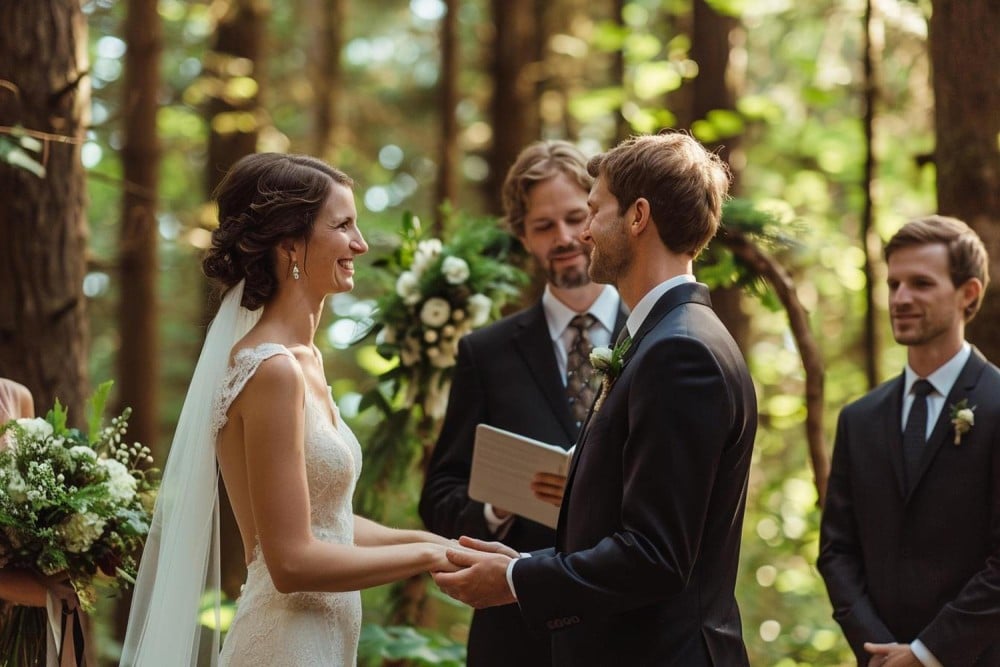 How to become a wedding officiant in tennessee ?Read more
How to become a wedding officiant in tennessee ?Read more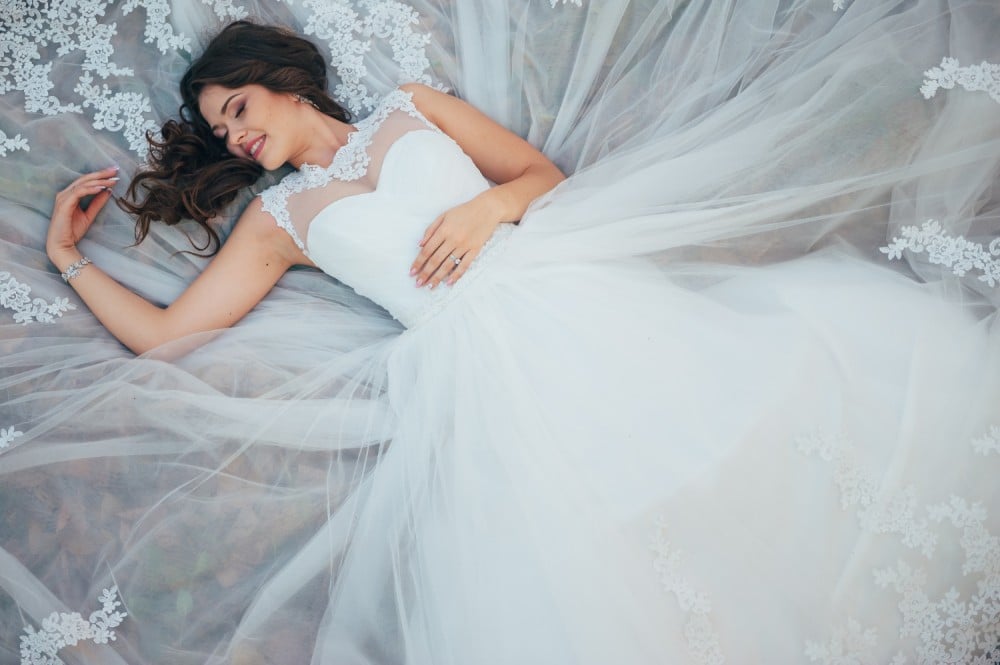 How to bustle a tulle wedding dress ?05/21/2024Posted in: Wedding Fashion & StyleRead more
How to bustle a tulle wedding dress ?05/21/2024Posted in: Wedding Fashion & StyleRead more Planning Your Honeymoon Tips for an Unforgettable Trip05/20/2024Posted in: Wedding PreparationsRead more
Planning Your Honeymoon Tips for an Unforgettable Trip05/20/2024Posted in: Wedding PreparationsRead more The Dos and Donts of Wedding Guest Etiquette05/16/2024Posted in: Wedding Traditions & EtiquetteRead more
The Dos and Donts of Wedding Guest Etiquette05/16/2024Posted in: Wedding Traditions & EtiquetteRead more The Importance of PreWedding Counseling What You Should Know05/13/2024Posted in: Wedding PreparationsRead more
The Importance of PreWedding Counseling What You Should Know05/13/2024Posted in: Wedding PreparationsRead more Can I wear beige to a wedding ?11/14/2023Posted in: Wedding Fashion & StyleOne of the most common questions when it comes to wedding guest attire is whether it's appropriate to wear beige to a...Read more
Can I wear beige to a wedding ?11/14/2023Posted in: Wedding Fashion & StyleOne of the most common questions when it comes to wedding guest attire is whether it's appropriate to wear beige to a...Read more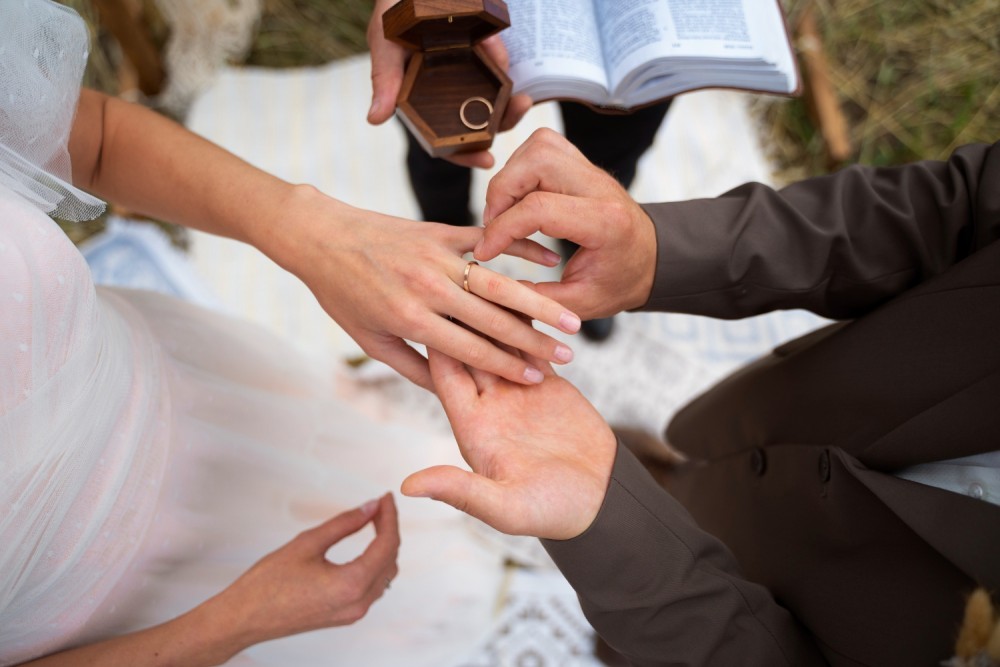 Do Jehovah Witnesses celebrate weddings ?02/29/2024Posted in: Wedding Traditions & EtiquetteJehovah’s Witnesses are known for their distinctive beliefs and practices, but what about weddings? In this...Read more
Do Jehovah Witnesses celebrate weddings ?02/29/2024Posted in: Wedding Traditions & EtiquetteJehovah’s Witnesses are known for their distinctive beliefs and practices, but what about weddings? In this...Read more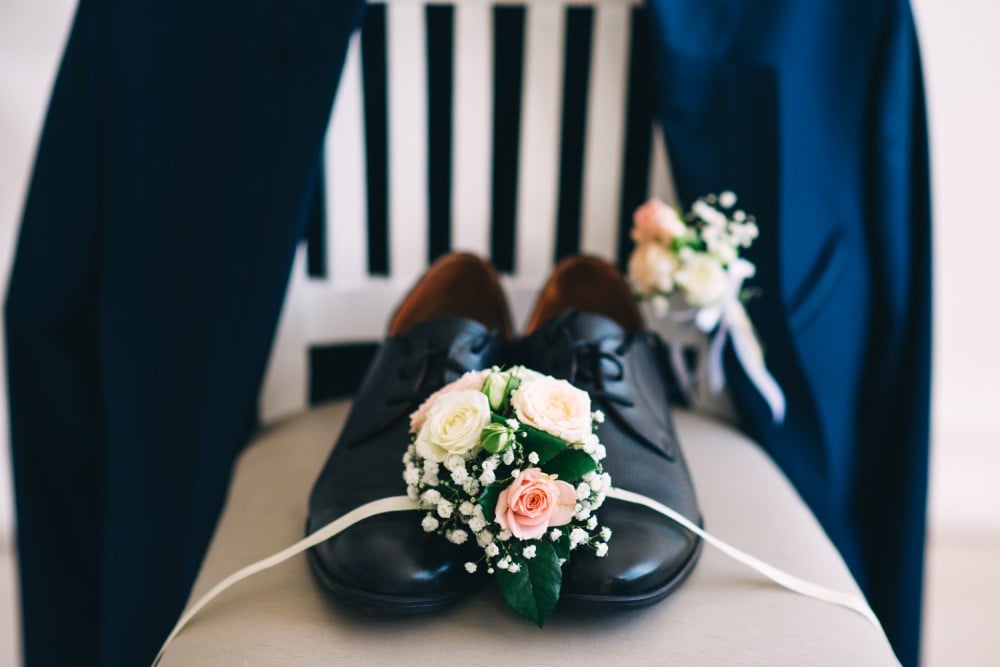 What color shoes with navy dress for Wedding ?08/20/2023Posted in: Wedding Fashion & StyleMatching shoe color with navy dress When teaming shoe color with a navy dress, it's essential to decide on a hue...Read more
What color shoes with navy dress for Wedding ?08/20/2023Posted in: Wedding Fashion & StyleMatching shoe color with navy dress When teaming shoe color with a navy dress, it's essential to decide on a hue...Read more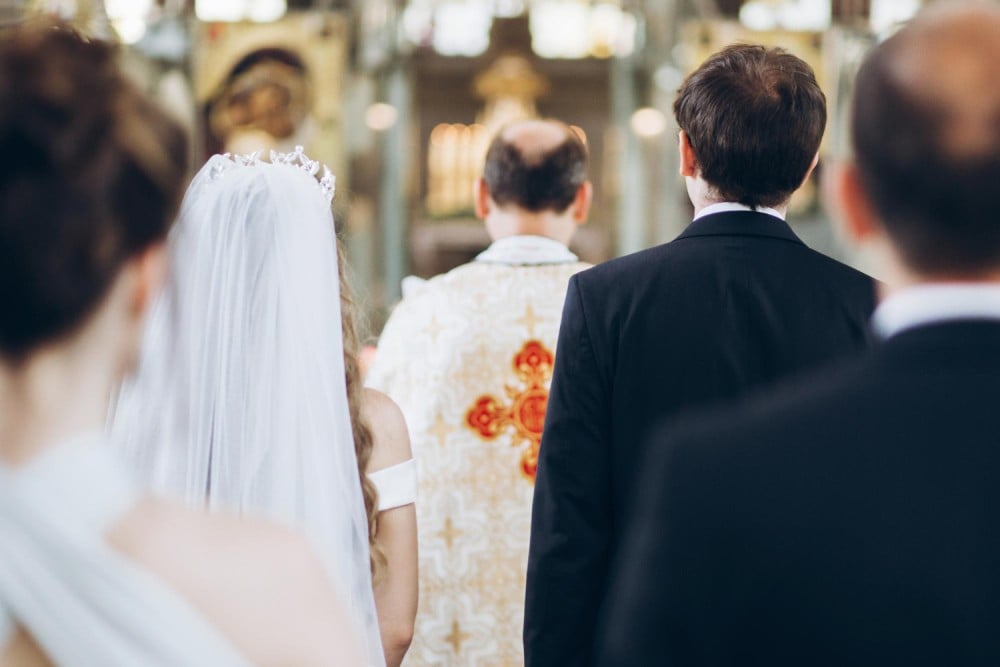 What to wear to a Church Wedding ?09/04/2023Posted in: Wedding Fashion & StyleAre you attending a church wedding and unsure about the dress code? Our latest article provides a deep dive into the...Read more
What to wear to a Church Wedding ?09/04/2023Posted in: Wedding Fashion & StyleAre you attending a church wedding and unsure about the dress code? Our latest article provides a deep dive into the...Read more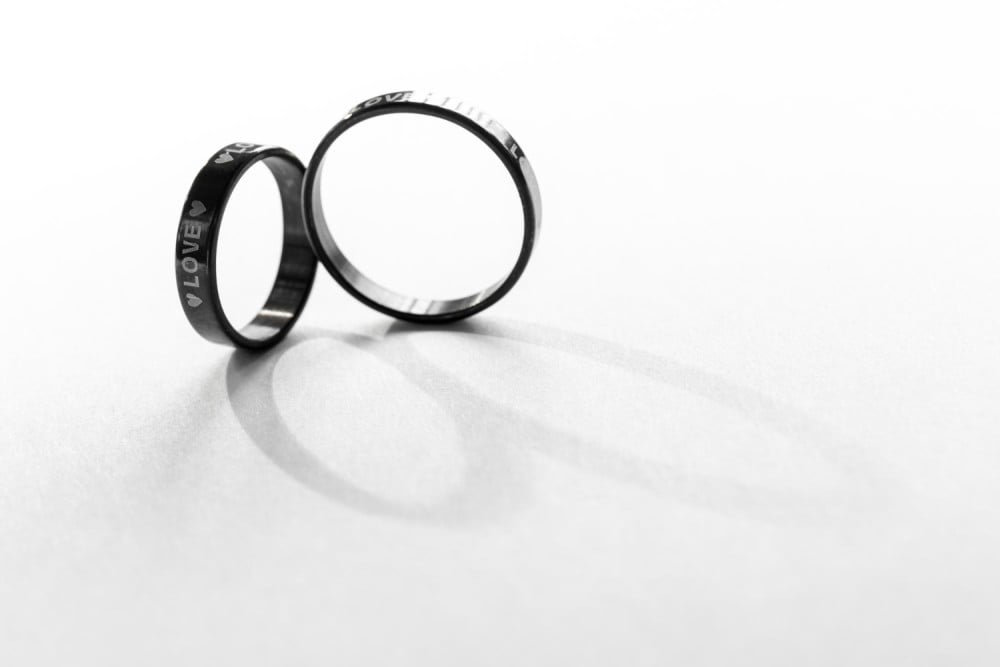 What does a black wedding ring mean ?06/12/2023Posted in: Miscellaneous Wedding AspectsWedding rings are a traditional symbol of love and commitment, but their style and design can vary greatly. In recent...Read more
What does a black wedding ring mean ?06/12/2023Posted in: Miscellaneous Wedding AspectsWedding rings are a traditional symbol of love and commitment, but their style and design can vary greatly. In recent...Read more How to become a wedding officiant in tennessee ?06/27/2024Looking to become a wedding officiant in Tennessee but not sure where to start? This comprehensive guide will walk...Read more
How to become a wedding officiant in tennessee ?06/27/2024Looking to become a wedding officiant in Tennessee but not sure where to start? This comprehensive guide will walk...Read more How to bustle a tulle wedding dress ?05/21/2024Posted in: Wedding Fashion & StyleAre you a bride-to-be with a tulle wedding dress and wondering how to bustle it for the big day? Look no further!...Read more
How to bustle a tulle wedding dress ?05/21/2024Posted in: Wedding Fashion & StyleAre you a bride-to-be with a tulle wedding dress and wondering how to bustle it for the big day? Look no further!...Read more Planning Your Honeymoon Tips for an Unforgettable Trip05/20/2024Posted in: Wedding PreparationsPlanning your honeymoon is an exciting and important step in beginning your life together as a married couple. From...Read more
Planning Your Honeymoon Tips for an Unforgettable Trip05/20/2024Posted in: Wedding PreparationsPlanning your honeymoon is an exciting and important step in beginning your life together as a married couple. From...Read more The Dos and Donts of Wedding Guest Etiquette05/16/2024Posted in: Wedding Traditions & EtiquettePlanning to attend a wedding soon? Make sure you brush up on your wedding guest etiquette to ensure you have a great...Read more
The Dos and Donts of Wedding Guest Etiquette05/16/2024Posted in: Wedding Traditions & EtiquettePlanning to attend a wedding soon? Make sure you brush up on your wedding guest etiquette to ensure you have a great...Read more The Importance of PreWedding Counseling What You Should Know05/13/2024Posted in: Wedding PreparationsAre you and your partner considering pre-marriage counseling but not sure what to expect? This article is here to...Read more
The Importance of PreWedding Counseling What You Should Know05/13/2024Posted in: Wedding PreparationsAre you and your partner considering pre-marriage counseling but not sure what to expect? This article is here to...Read more








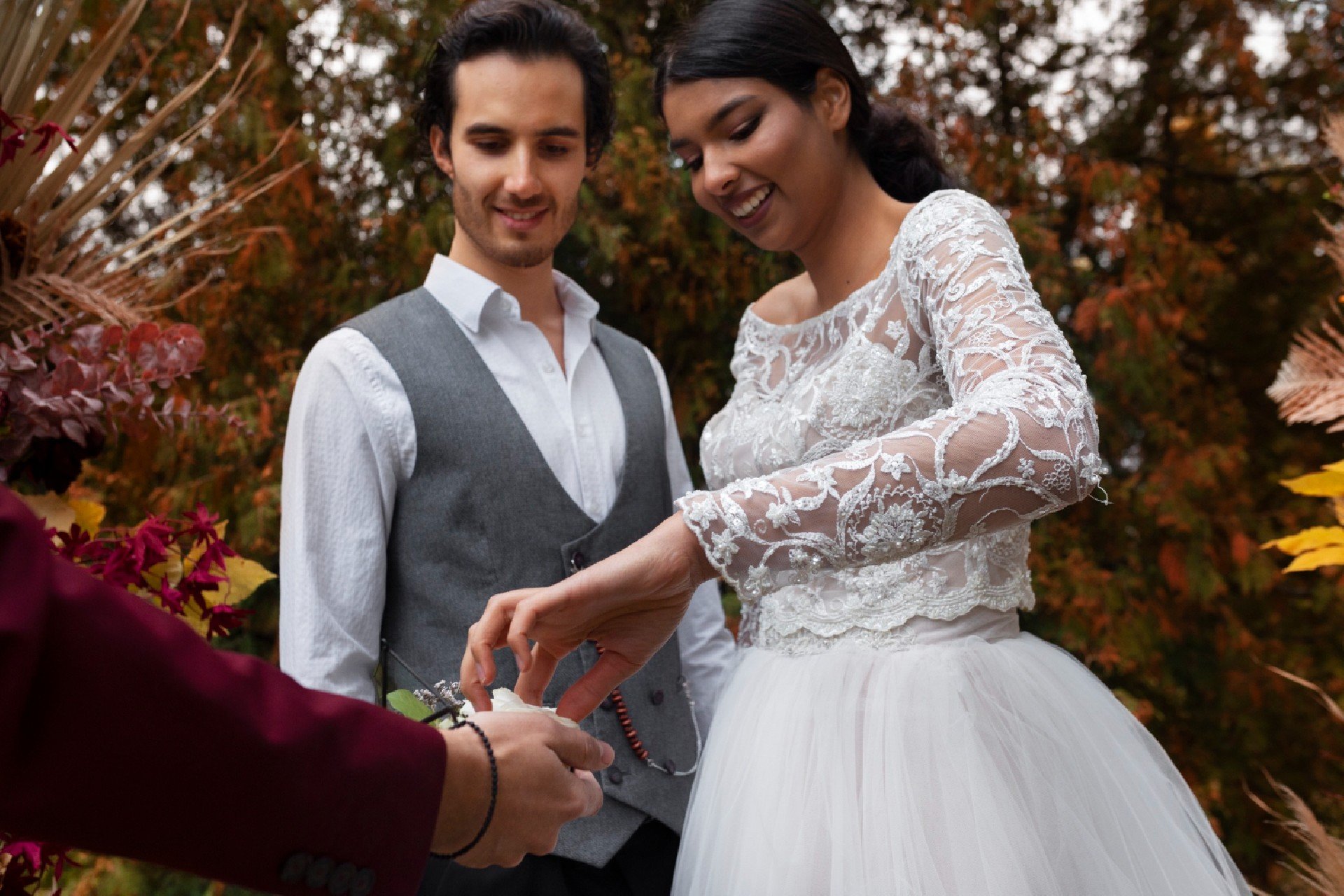


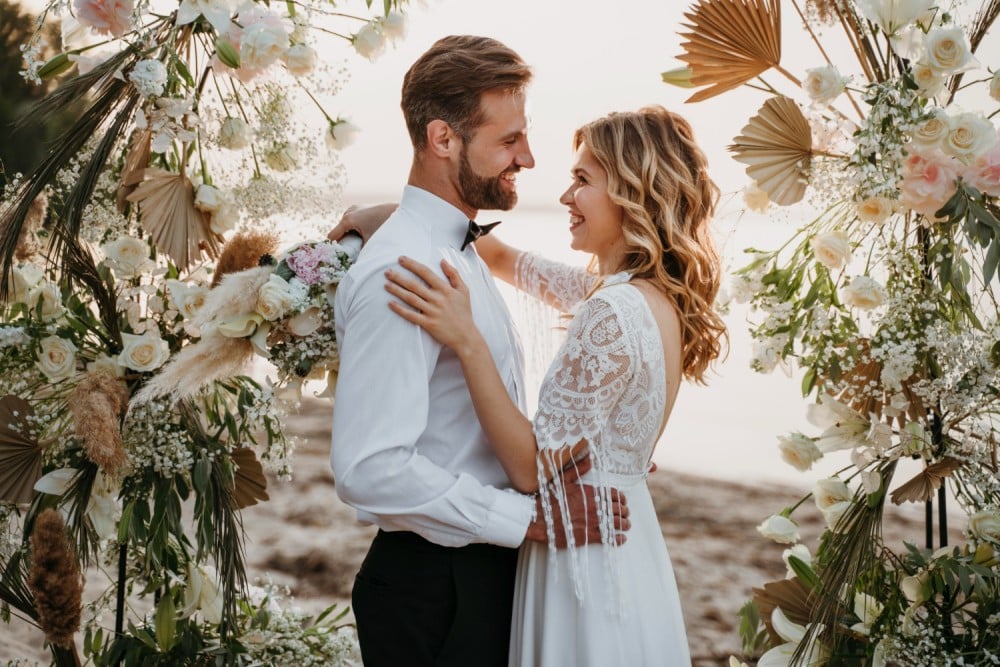
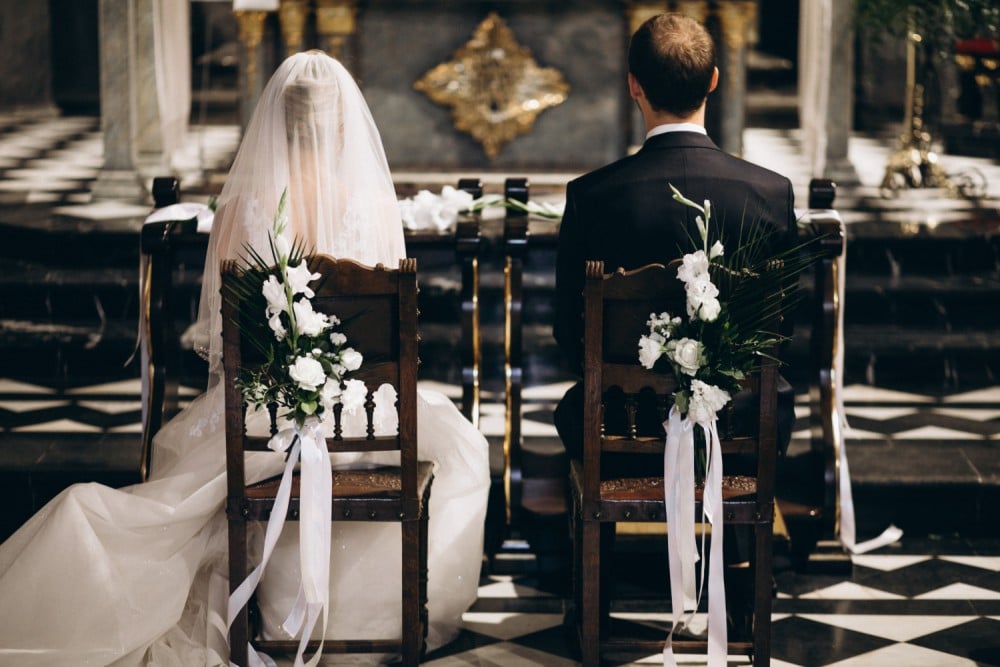
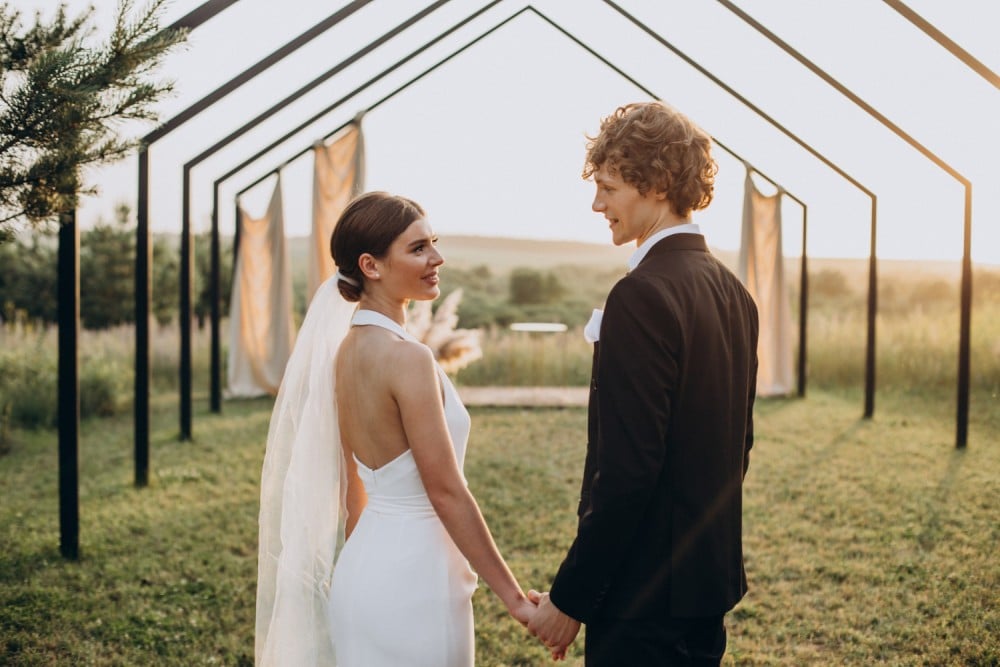
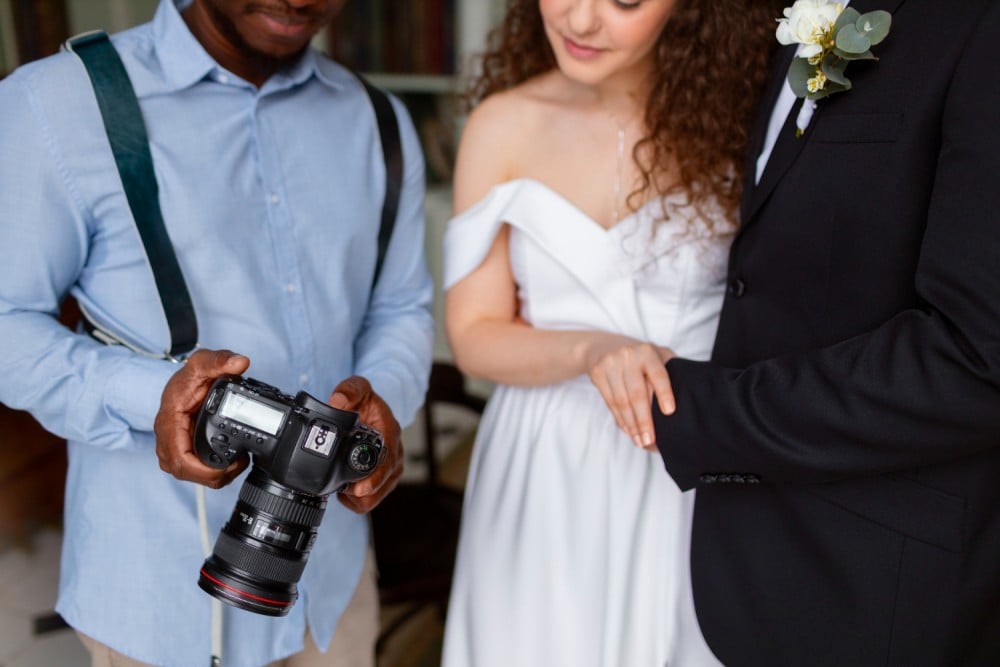
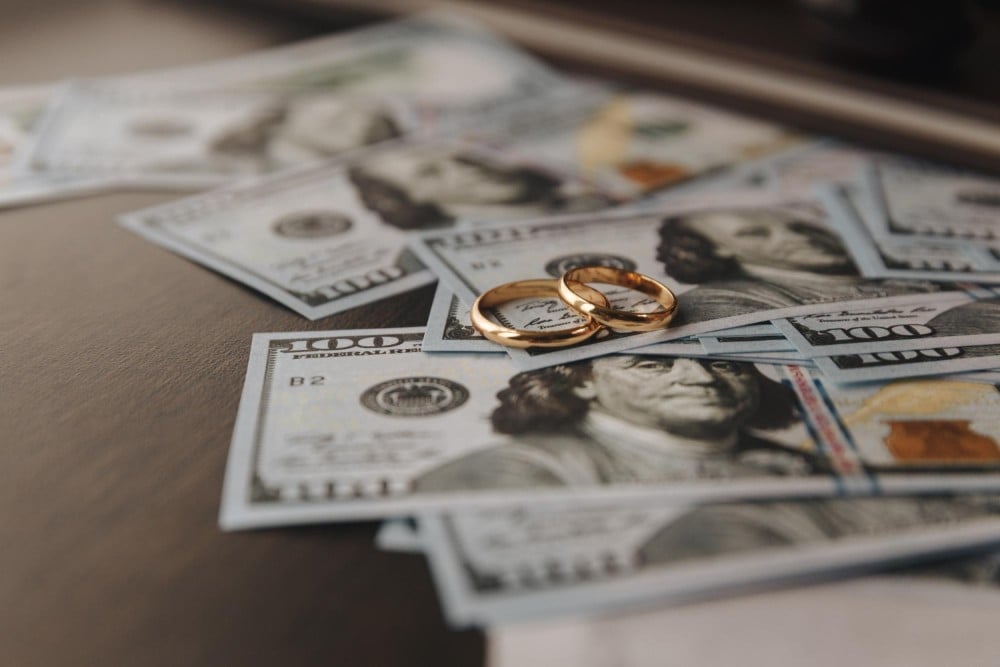
Top authors